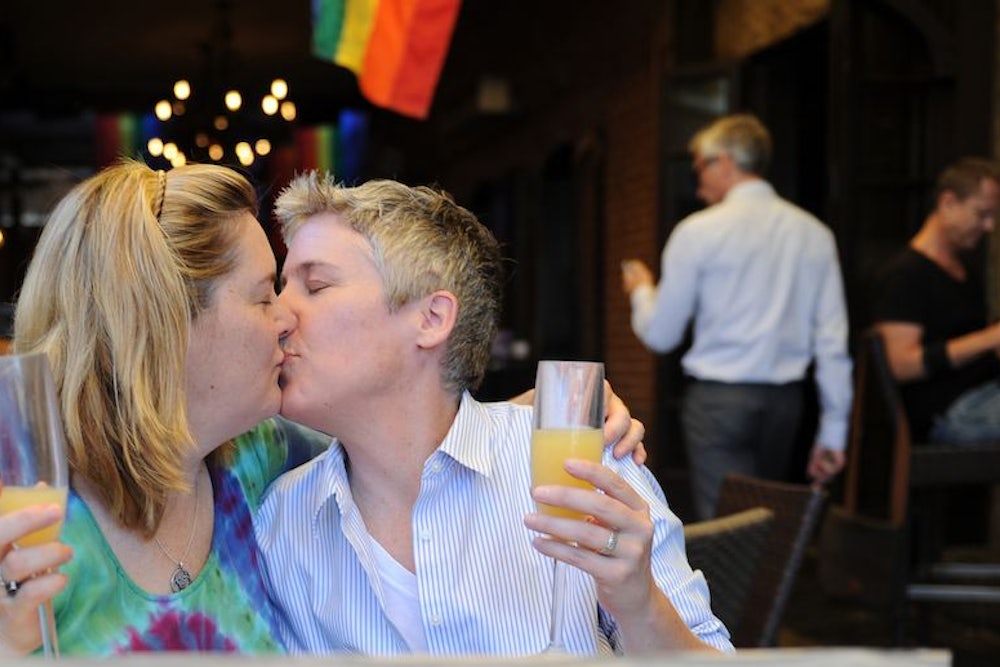The Supreme Court didn’t rule on the constitutionality of state same-sex marriage bans this week, perhaps hoping that public opinion could resolve the issue without court intervention. You can see why the Court might be optimistic: the trend-lines are positive, with support for gay marriage increasing by 1 to 2 percent per year. On that basis, Nate Silver projected that support for same sex marriage will ultimately spread to 44 of the 50 states by 2020—at which point the Supreme Court could make same sex marriage law of the land without too much controversy. I’m not so optimistic: when the Court gets around to resolving the issue, it might still be a controversial and partisan issue.
When people discuss the inexorable rise of support for gay marriage, they talk about it like racial integration. The supporters of Jim Crow were routed: it became impossible to publicly support segregation, and the opposition eventually died or flipped. But there’s another possibility: that gay marriage is somewhat more like abortion, where consensus doesn't come easily and steadfast opposition persists, largely for moral and religious reasons. So far, the data suggests that gay marriage might be more like abortion, where opposition hasn't evaporated.
Evangelical and Republican opposition to same sex marriage hasn’t budged. According to Pew Research, Republican support for gay marriage has only crept up by a net-7 points since 2003, from 22-71 to 25-67. White evangelicals have moved a little quicker, but they still oppose by a 75-19 margin—a net-15 point improvement from 2003. In comparison, the public as a whole has shifted 30 points toward gay marriage—despite being held back by Republicans and evangelicals. Generational change isn’t helping very much, either. Just 30 percent of 18-34 year old evangelicals support gay marriage, which isn’t a huge improvement from the 25 percent who supported it in 2003. Young Republicans are a little more supportive of gay marriage than young evangelicals, but they still oppose gay marriage by 15 points, 39-54.
The reluctance of evangelicals and Republicans to flip on gay marriage doesn’t mean their opposition will endure indefinitely, as it has in the context of abortion. But if much of the remaining opposition to gay marriage is founded on firm religious and moral beliefs, not bigotry or animus, evangelicals will probably hold out for a long time. That possibility casts doubt on the theory that universal support for gay marriage is inevitable. At the very least, it does not augur well for the Supreme Court Justices who hope the public will resolve the issue before the Court makes same sex marriage the law of the land.
In a country deeply polarized by partisanship and religiosity, gay marriage can't become broadly popular unless Republicans and evangelicals start changing their minds—and quickly. Take a competitive Southern state like North Carolina. Even there, 40 percent of voters are white evangelical Christians—and the state has a large, conservative black population, as well. And that’s a state with large, well-educated, liberal metropolitan areas, like Raleigh-Durham-Chapel Hill and Charlotte. Unless there’s a breakthrough among evangelicals and Republicans, popular support for gay marriage is likely to remain confined to the blue states.
The resistance of conservatives and evangelicals to gay marriage also poses a problem for the Republicans who wish the party would moderate its stance on social issues. These culturally liberal Republicans might wish they were funding a different party, but evangelicals and social conservatives are central to the modern GOP. Evangelicals represent 40 percent of self-identified Republicans, and an even larger share of Republican presidential primary voters in critical states like Michigan (42%), Florida (47%), Ohio (49%), Iowa (57%), and South Carolina (65%). So long as evangelicals remain opposed to gay marriage, the GOP just isn’t positioned to switch. And if the GOP doesn’t switch, then same-sex marriage will probably still be controversial by the time the Supreme Court is forced to consider the issue, once and for all.
Correction: A previous version of this article misspelled Jim Crow.
